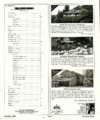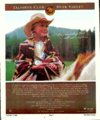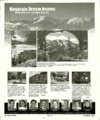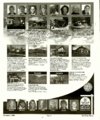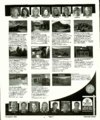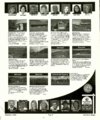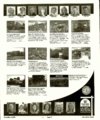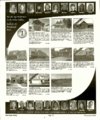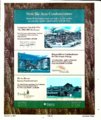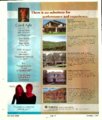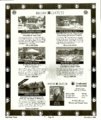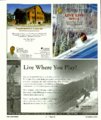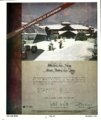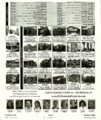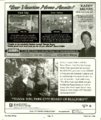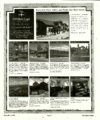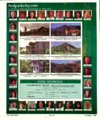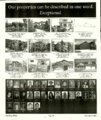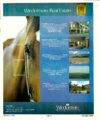| OCR Text |
Show THE PARK RECORD ike mom and apple pie Voting America is more than mom and apple pie. On Tuesday, Election Day, it is going to the polls as well. People in Summit County face a critical ballot, one that is unusual in its breadth, ranging from Summit County Commission candidates to conservation ballot measures, from congressional candidates to whether to redo Summit County's form of government. As the area enters the final days of Campaign 2006, people in Summit County and, yes, Park City is in the county, should prepare to vote on Tuesday. The trend in off-year elections, those when the White House is not on the ballot, is that people do not head out to the polls. Locally, that should not happen in 2006. Just browse through a sample ballot and its importance to everyone in the county is apparent. Whether Summit County junks its historic three-person County Commission in favor of an expanded panel with help from what would be a newly created county manager position will be decided. Park City's open-space program, which has delivered swaths of stunning land, is essentially out of money and needs the $20 million contained in a ballot measure to continue with the same vigor. The Bob Richer-Bill Miles campaign for the County Commission, meanwhile, is a classic Summit County barnburner, one of the best of the county's modern era. The differences between the two are palpable. Which one wins likely depends on how many people from the West Side go to the polls. If they stay home, Miles will probably win and if they vote in big numbers, Richer could keep his seat at the County Courthouse. And people should not discount the Statehouse and congressional candidates on the ballot. Voters will anoint new state legislators for much of Summit County. The congressional elections are seen as a report card on the Bush administration, especially its Iraqi war. Mom and apple pie can wait for a few minutes on Election Day. Special bond elections Props for^apr-opbsifion A pool party •Who votes on this? Registered voters in the Snyderville Basin Recreation District (zip code 84098) •What will it do? The bond would allow the Snyderville Basin Special Recreation District to issue $12 million in bonds to expand the field house, build a leisure pool and expand the Basin trail system •How much will it cost me? The bonds would cost primary homeowners in the district about $15 per year per $100,000 of taxable value of their properties. Second homeowners and commercial property owners would pay about $30 per $100,000. A leisure pool with slides, fountains and a lazy river is slated at Kimball Junction should voters on Election Day pass a $12 million recreation bond. Snyderville Basin Special Recreation District officials have contemplated expanding the Basin Recreation Field House with a pool and climbing wall since the project began in 2003. Most of those surveyed recently expressed support for spending roughly $9 million to build a swimming pool and gymnasium, said Bonnie Park, who is a spokeswoman for the district. Homeowners in Snyderville whose property is worth $400,000 would reportedly see their taxes increase about $60 per year if the pool bond is passed. In 2006 they paid Basin Recreation almost $46 in taxes per every $100,000 of their home's value. Roughly $3 million leftover from the bond after the pool is built could be used to construct and maintain additional trails in the area. When Basin Recreation conducted a needs assessment three years ago an indoor sports facility was reportedly the most requested item by constituents. Talks continue between Basin Recreation and the Park City School District after school board members became concerned about building another swimming pool so near an aquatic center they operate at Ecker Hill Middle School. The recreation bond question is before voters living in the boundaries of the Park City School District, outside of the Park City limits. If approved, the bond could increase property taxes for homeowners in Snyderville about $15 per every $100,000 of taxable value. The owners of second homes and commercial property in Snyderville should expect to pay almost double. TO voting information, including polling places, candidate forumsl • • • and more, visit d;COin/vote yrxr fUso, log on to keep pace with election results as they come in TUesday night. $ & •Who votes on this? Everyone who is registered to vote in Summit County •What will it do? If approved the current three-member county commission would change to a five-member council with an appointed county manager •How much will it cost me? Supporters say the change would not require an increase in taxes. Opponents say an increase would be inevitable. Throughout its history, Summit County has been run by a threemember commission along with seven elected department heads. TSvo years ago, however, voters approved a measure to study changing the county's form of government. As proposed by the governance study committee, Summit County's three-member commission would change to a five-member county council with an appointed county manager. All five seats would be elected at large. The powers and responsibilities of the county's seven other elected department heads (clerk, auditor, assessor, treasurer, recorder, sheriff and attorney) would be unchanged. The study committee debated the merits of electing the councilors by district but, in order to balance the population in each district, Park City and the Basin would have had more representation than North and South Summit so that approach was scrapped. The committee also debated whether the county manager should be elected or appointed and decided that it would be preferable to hire a manager based on qualifications rather than elected based on popularity. Under the current proposal, applicants for the manager's post must have a degree in public administration or finance and have five years of experience in city or county government. According to the executive summary of the committee's recommendation: "The current three member Commission fulfills both the legislative (policy making) and administrative (policy implementation) functions of government. The Plan separates these functions. While supposedly part- time, the Commissioners devote substantial time and energy to required and necessary functions of Summit County. Additionally, the part-time Commission form of government does not allow for daily administrative governance. The proposed five member Council would fulfill the legislative role. "Manager would fulfill the administrative role, working for and reporting to the County Council. With this distribution of jobs, the Council would be truly part-time and would be able to focus on longterm strategic planning for the future of Summit County. Moreover, having a five member Council would allow for more citizen participation in government with broader representation. "The Manager would be appointed by and can be fired by the Council. The Manager would have no veto power. The Manager would be the administrative head of county government. The Manager would supervise appointed departments but would not supervise elected offices. In that sense, the operation of county government would not change. The citizens of Summit County would, however, gain access on a daily basis to a centralized administrative head with responsibility and accountability for the overall coordination of county government. "The powers, assets and obligations of county government would not change. Nor would the establishment and power of any municipalities or special service districts. Powers and responsibilities of elected officials, and department heads would not change. The Commission and the Form of Government Study Group have determined that the proposed Plan will not require an increase in taxes. "If the Plan is adopted by the Commission, it will be voted on in November 2006 and if approved by the voters, will be implemented through election of a County Council in November 2008 and the Commission form will be dissolved. The Council will then appoint the Manager." The entire report can be found online at: http://www.summitcounty.org/commission/downloads/ReportFina!2006.pdf Conservation, not consternation or commercial property, the tab would be an additional $44.00 per $100,000. Voters in Park City have previously overwhelmingly passed two such bonds, one in 1998 and the other in 2002. Each of those ballot measures was worth $10 million. With the money from the previous bonds, City Hall bought high-profile parcels like the Richards Ranch off S.R. 224, the westernmost portion of the Rail Trail and large swaths of land in Round Valley. . But officials say that it has People who live in the Park City limits on Election Day will proven more difficult to find decide whether to boost City deals in recent years as land Hall's open-space coffers with values have climbed. They say, though, that, with another $20 another $20 million. The local government wants million, there could be addiPark City voters to pass an tional prized purchases. They open-space bond, the third of do not give details, however. its kind in Park City. There has been little public Officials and other support- debate about the ballot measers say that the money is need- ure in the weeks before ed to continue Park City's Election Day. Voters are renowned conservation pro- expected to approve the bond gram, which has protected but it is unclear if the support huge tracts of land in and will be as widespread as that around the city, more than of the previous two bonds, 1,500 acres, according to City which passed with at least 78 percent of the vote. ; Hall. If the ballot measure passes, An open-space committee: a person owning a primary res- recommends purchases to the idence will pay an additional City Council, with the elected $24.50 per year for each officials then determining $100,000 of assessed value. For whether to pursue negotiapeople owning vacation homes tions with a landowner. •Who votes on this? Only those registered to vote in Park City proper •What will it do? It will authorize Park City to borrow $20 million to buy land to set aside as open space. •How much will it cost me? If approved it would add $24.50 per year for each $100,000 of assessed value on primary homes or $44.00 per $100,000 per year on second homes and commercial proper> ties. The following Summit Cotmty elected officials filed to run for another term and are running unopposed: Commissioner: Democrat Ken Woolstenhulme Assessor: Democrat Barbara Kresser^ Attorney: Republican David Brickey^ Auditor: Democrat Blake Fra?iei^^ Recorder: Democrat Alan Spriggs^1 Treasurer:-Republican Glen Thompson v |




























































